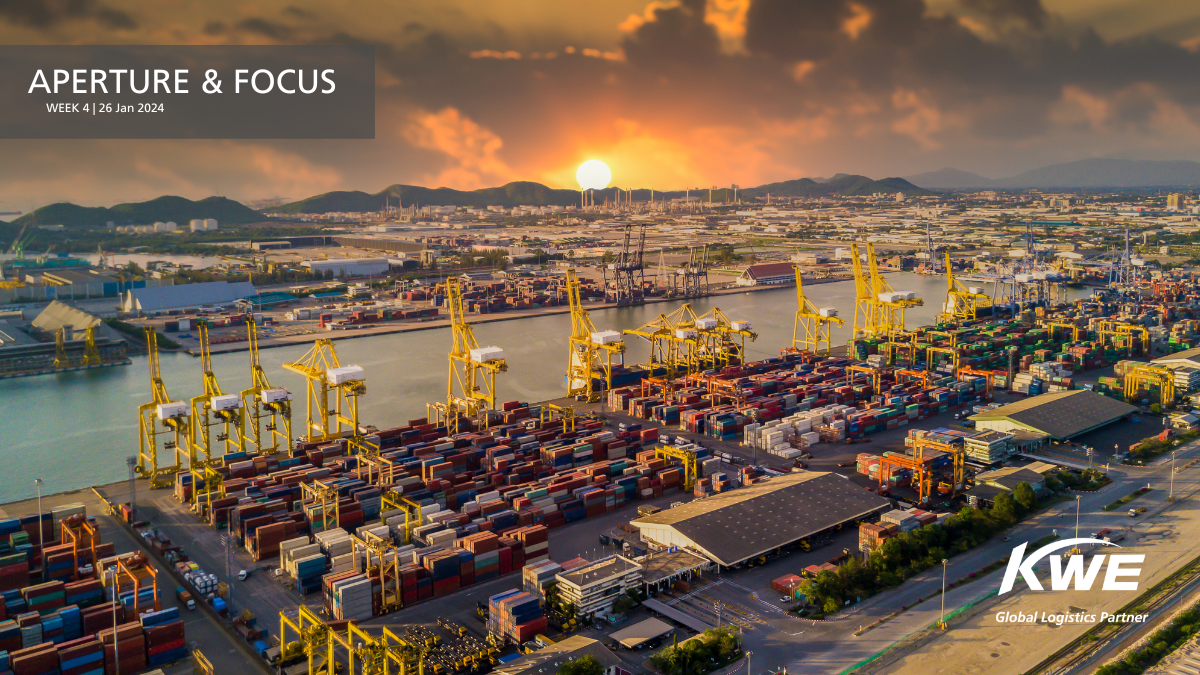Quote
Aperture & Focus 2024: Week 4

Global Aperture
The India-Middle East-Europe Economic Corridor (IMEC), a significant plan to enhance trade between Europe and Asia through the Middle East, is facing new delays amid the Israel-Hamas war. The project, aimed at countering China's Belt and Road initiative, building influence in the Global South, and fostering relations between Israel and Saudi Arabia, has been put on hold amid Houthi attacks disrupting Red Sea shipping and regional turmoil.
Air freight demand has increased dramatically amid the Red Sea crisis, particularly for cargo bound for Europe. Concerns about prolonged Red Sea disruptions and high cargo demand have prompted companies to consider alternative shipping methods and routes to mitigate supply chain delays.
Regional Focus
Americas
United States: According to recent analysis, nearshoring is expected to boost US-Mexico trade in 2024, with cross-border operators anticipating increased daily shipments, especially in auto parts and vehicles. Factors such as Mexico's proximity to the U.S., skilled workforce, and favorable trade conditions under the United States–Mexico–Canada Agreement are driving the shift, but challenges like a shortage of raw materials may impact growth in various manufacturing industries.
U.S. importers have been redirecting their focus towards Southern California ports— specifically the Ports of Los Angeles and Long Beach, where containerized imports have experienced year-over-year increases of 17% in September and 31% in November. Disruptions at the Panama and Suez Canals have contributed to this resurgence, challenging the migration to East Coast and Gulf Coast ports following last year’s West Coast labor disputes.
Asia-Pacific
Korea/ Vietnam: Korea and Vietnam's governments started taking measures on January 22nd to secure container shipping capacity for domestic exporters impacted by the Red Sea crisis. South Korea's Ministry of Oceans and Fisheries has urged mainline operators to reserve slots for local Small and Medium-sized Enterprises (SMEs) on Asia-Europe voyages. Meanwhile, Vietnam's Ministry of Transport instructed the Vietnam Maritime Administration to help exporters by negotiating with liner operators to increase connections between Vietnam, Europe, and the US.
India: Indian exporters are facing a supply chain challenge due to the Red Sea crisis, leading to a deficit of available containers at key ports such as Nhava Sheva and Mundra. This equipment scarcity has prompted exporters to scale back shipping orders, threatening the recovery signs in India's merchandise export trade.
Europe, Middle East & Africa
Europe: Major electric vehicle (EV) manufacturers have paused production due to a parts shortage caused by the Red Sea crisis. The rebel attacks have forced ships to avoid the Red Sea, causing delays and concerns about EV supply chain resilience, prompting some manufacturers to air-freight parts to European Union factories.
Greece: Over 200,000 containers destined for Piraeus port are facing delays of up to 20 days due to the Red Sea crisis, according to the Athens Chamber of Tradesmen. The diversion from Asia via the Cape of Good Hope in South Africa has particularly impacted Mediterranean ports, adding around two weeks to the voyage, potentially resulting in shortages of goods such as electrical items, mobile phones, and clothing imported from the Far East.
Germany: Freight train drivers at Germany's state-owned rail firm Deutsche Bahn (DB) began a strike on January 23rd that is set to extend through January 29th, marking one of the longest industrial actions on the country's rail network. The strike follows the rejection of DB's third offer and raises concerns among industrial associations about supply chain disruptions.
France: On January 24, French farmers intensified their second week of protests over policies that have impacted their earning potential by blocking roads, highways, and commercial zones with tractors, bales of hay, and produce. Representatives from the FNSEA, France’s biggest farmer’s union, have stated that protests will continue until demands to improve the living and working conditions of farmers have been met.